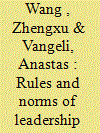| Srl | Item |
| 1 |
ID:
187939


|
|
|
|
|
| Summary/Abstract |
China's expanding middle class is often found to support the regime and lack democratic aspirations. We find that one section of the middle class depends upon the state for jobs and other material benefits, and the other works for the private and foreign sectors of the country's economy. Once separated as such, we found that the non-state middle class clearly shows lower support for the regime. Furthermore, unlike the state middle class, which registers lower democratic support, the non-state middle class shows a similar level of democratic support as other social classes. In general, however, while only pragmatically accepting the current order, both middle class groups nonetheless appear lacking practical knowledge and understanding of liberal democratic institutions such as free media and multiparty elections. The unforthcoming attitudes toward democracy might also derive from a general sense of fearing the loss of order and the other related uncertainties.
|
|
|
|
|
|
|
|
|
|
|
|
|
|
|
|
| 2 |
ID:
145795


|
|
|
|
|
| Summary/Abstract |
Under Deng Xiaoping, the Chinese Communist Party started to institutionalize leadership succession in the 1980s. Peaceful and orderly succession of the top political offices, however, only started to take shape in the early 1990s. We identify three sets of rules and norms formed since then to govern elite replacement and power succession. These concern top leaders’ exit from power, selection of successors, and the transition of power between outgoing and incoming leaders. We trace the evolving process in which these rules were made and accepted by the Party elite between 1992 and 2012. Incidents, however, also showed the malleability of some of these rules and the potential rise of ambitious rule challengers. Into Xi Jinping’s era, uncertainty still threatens the revision or abandonment of some of these rules, and continuous attention is needed in order to understand the likely trajectories of the Chinese political system.
|
|
|
|
|
|
|
|
|
|
|
|
|
|
|
|